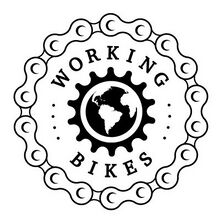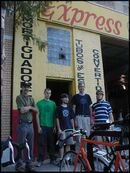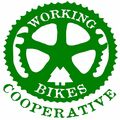Working Bikes
Topic: Organization
 From HandWiki - Reading time: 5 min
From HandWiki - Reading time: 5 min
 | |
| Founded | 1999 |
|---|---|
| Founders | Amy Little, Lee Ravenscroft |
| Type | Non-profit organization |
| Purpose | Giving old bikes a new home |
| Location |
|
Area served | Africa, Central and South America, Middle East, Oceania, United States |
| Website | Working Bikes |
Working Bikes is a not-for-profit tax-exempt 501(c)3 volunteer-driven organization based in Chicago, IL that aims to divert bicycles from the waste stream and put them to use in Chicago and abroad.[1] It operates a warehouse, shipping center, repair shop and retail outlet from its location in the Pilsen neighborhood.[2] Working Bikes mission is to provide bicycles to charity organizations in the Chicago area to benefit youth, transitioning homeless and refugees as well as to ship bicycles to the Gulf Coast and around the world.[3]
Each year Working Bikes aims to sell 2,000 refurbished bikes through its storefront and runs a repair shop to keep bikes in operation. It uses the proceeds from these activities to give away approximately 6,000 bikes per year.[3] Since its inception, as cited within the Working Bikes 2018 Annual Report, "More than 70,000 bikes have been given new life across our region and the world".[4]
Founding and History
Lee Ravenscroft started a one man garage operation by simply collecting old discarded bikes and fixing them up. Later he intercepted bikes being hauled by 'metal scrappers' on their way to recycling centers paying five dollars for them. Initially bikes where kept and repaired in a basement which was eventually outgrown by the expanding operation.
Lee along with Amy Little, who saw the need for bikes in Central America while in the Peace Corps, and a group of volunteers started Working Bikes. After its first shipment to Nicaragua the operation grew into its first location at 927 & 1125 (the warehouse & storefront, respectively) S. Western Avenue.
In 2009 the operation moved into its current home, a three floor 20,000 square foot building at 2434 S. Western Avenue which brought the store and warehouse under one roof and allowed the organization to expand.
The building itself was originally erected by developer Martin DeTamble in 1896. In 1908 the building housed the street lighting contractor American Development Co which supplied more than 50,000 lamps that were used to light Chicago city streets prior to the use of outdoor electric lighting. From 1913-1919 the Murphy Chair Company occupied the building.
Most notably in 1923 the Thorkildsen-Mather Borax Company utilized the building, which was co-founded by Stephen Mather who went on to be the first Director of the National Park Service. From 1933-1982 Sleepmakers a spring, mattress and couch company used the building and later in 1988 the Izguerra Furniture store resided there.
Volunteers and Partners
As ex-general manager Paul Fitzgerald[4] said "Without the volunteers Working Bikes would not be able to operate". Volunteers help with everything from repairing bikes, aiding customers to packing 500 or so bicycles into forty foot containers that are shipped around the world.
In addition to individuals Working Bikes depends on the many churches, businesses, police departments, park districts, recycling events, Eagle Scout and Girl Scout bike drives, property management companies, universities, condo/apartments, townships, bike stores, and other groups individuals and organizations that provide bikes, drop off locations, do independent bike drives in addition to helping pack trucks and fix bikes.
Storefront
Working Bikes sells refurbished bikes to the public as well as a wide range of helmets, lights, locks, components and merchandise. It operates a full repair shop and sells bikes, select components and merchandise through an online store. The funds from these (with program funding, grants and individual donations) enable Working Bikes to operate.[5]
During the 2020 COVID-19 pandemic event Working Bikes, along with a coalition of 78 other bikes stores, legislators and advocacy groups petitioned the state to enable all bike stores to stay open and continue to provide their services to the public. [6] In March of 2020 Governor J. B. Pritzker signed Executive Order 2020-32 which deemed "bike shops and related facilities" as an essential service enabling bike stores across Illinois to operate during the shutdown. [7]
Local Programs
Working Bikes strives to connect with the local community and is involved in a range of programs; Brandons Basics offers free beginning bike repair classes, WTF Night is a volunteer session exclusively for women, transgender, and gender non-conforming volunteers, participates in leadership training programs including After School Matters, hosts numerous bike rides around the city for various groups, supports bicycle safety and advocacy efforts, hosts dinners and community meetings among other efforts.
Working Bikes donates about 25% of its bikes to local partners and a wide range of community groups and social service organizations in Chicago to support Veterans, youth and other community groups through their Cycles of Power and Cycles of Peace programs. Some of these include the Chicago Help Initiative, Instituto Health Sciences Career Academy, Renaissance Social Services, Refugee One, Rehabilitative Systems, Mercy Housing, Better Boys Foundation, Hines Veteran Hospital, the Salvation Army, Streetwise, Chicago Help Initiative, One Summer Chicago and many, many others.
Working Bikes even donates bikes other community bicycle programs so that the benefits of cycling can be expanded. These include, among others: Blackstone Bicycle Works, Revolutions Bike Co-op Memphis and the Milwaukee Bike Collective.
In 2018 the operation began participating with Open House Chicago for tours including parts of the building usually unseen by the public. The operation also works through the year to collect and repair children's bikes which are provided to various efforts and provided, most notably, in the annual year-end holiday kids bike sale event.
Global Programs
Working Bikes regularly ships cargo containers full of bikes to its various global partners which have included:
- Costa Rica Fundación Integral Campesina (FINCA)
- El Salvador Fundación Salvadoreña para la Salud y el Desarrollo Humano (FUSAL)
- Ghana Village Bicycle Project
- Guatemala Maya Pedal
- Lesotho Bikes for Lesotho
- Namibia Bicycle Empowerment Network (BEN)
- Nicaragua Peaceworks
- Panama Global Goodwill Panama
- Peru Corprodeli
- South Africa Bicycle Empowerment Network (BEN)
- Uganda Prisoners Support Organization
- Zambia Hands of Hope
Bikes have also been sent to Angola, Belize, Botswana, Dominican Republic, Egypt, Fiji, Ghana, Guatemala, Haiti, Honduras, Jordan, Kenya, Madagascar, Malawi, Nigeria, Sierra Leone, Syria, Tanzania. Bikes have also been included in shipments to Cuba through the Pastors for Peace caravans. In addition to sending bikes, shipments may also include; cycling helmets, a full range of spare parts, wheelchairs, crutches and even sewing machines to developing areas where these donations can make a notable impact on the lives of the recipients.
Images
- WB2018Flow.png
See also
- Bicycle poverty reduction
- The Good Container
- Bikes Not Bombs
- Bikes to Rwanda
- World Bicycle Relief
References
- ↑ Margaret Sheridan (March 24, 2013). "Remarkable Woman: Amy Little". Chicago Tribune. http://articles.chicagotribune.com/2013-03-24/features/ct-tribu-remarkable-little-20130324_1_bikes-lee-ravenscroft-electrical-engineer. Retrieved 2013-06-08.
- ↑ Kevin Warwick (May 5, 2011). "Working Bikes Co-op welcomes all bikes, even the really screwed-up ones". Chicago Reader. http://www.chicagoreader.com/chicago/mudville-working-bikes-cooperative-pilsen/Content?oid=3724058. Retrieved 2013-06-08.
- ↑ 3.0 3.1 Dan Bush (Apr 7, 2011). "Working Bikes Cooperative". UPChicago. http://www.upchicago.com/working-bikes-cooperative. Retrieved 2013-06-08.
- ↑ 4.0 4.1 "2018 Annual Report". https://www.workingbikes.org/wp-content/uploads/2019/03/2018-Working-Bikes-Annual-Report_Draft-with-Links.pdf.
- ↑ "Active Transportation Alliance". Lonely Planet. http://www.lonelyplanet.com/usa/chicago/activities/other/working-bikes-cooperative. Retrieved 2013-06-08.
- ↑ "Bike shops must stay open during possible “shelter in place” order.". https://activetrans.org/blog/bike-shops-must-stay-open-during-shelter-in-place-order.
- ↑ "Illinois Executive Order 2020-32". https://www2.illinois.gov/Documents/ExecOrders/2020/ExecutiveOrder-2020-10.pdf.
External links
- Working Bikes
- Social Media: Twitter, Instagram, Instagram Storefront, Facebook
 KSF
KSF


